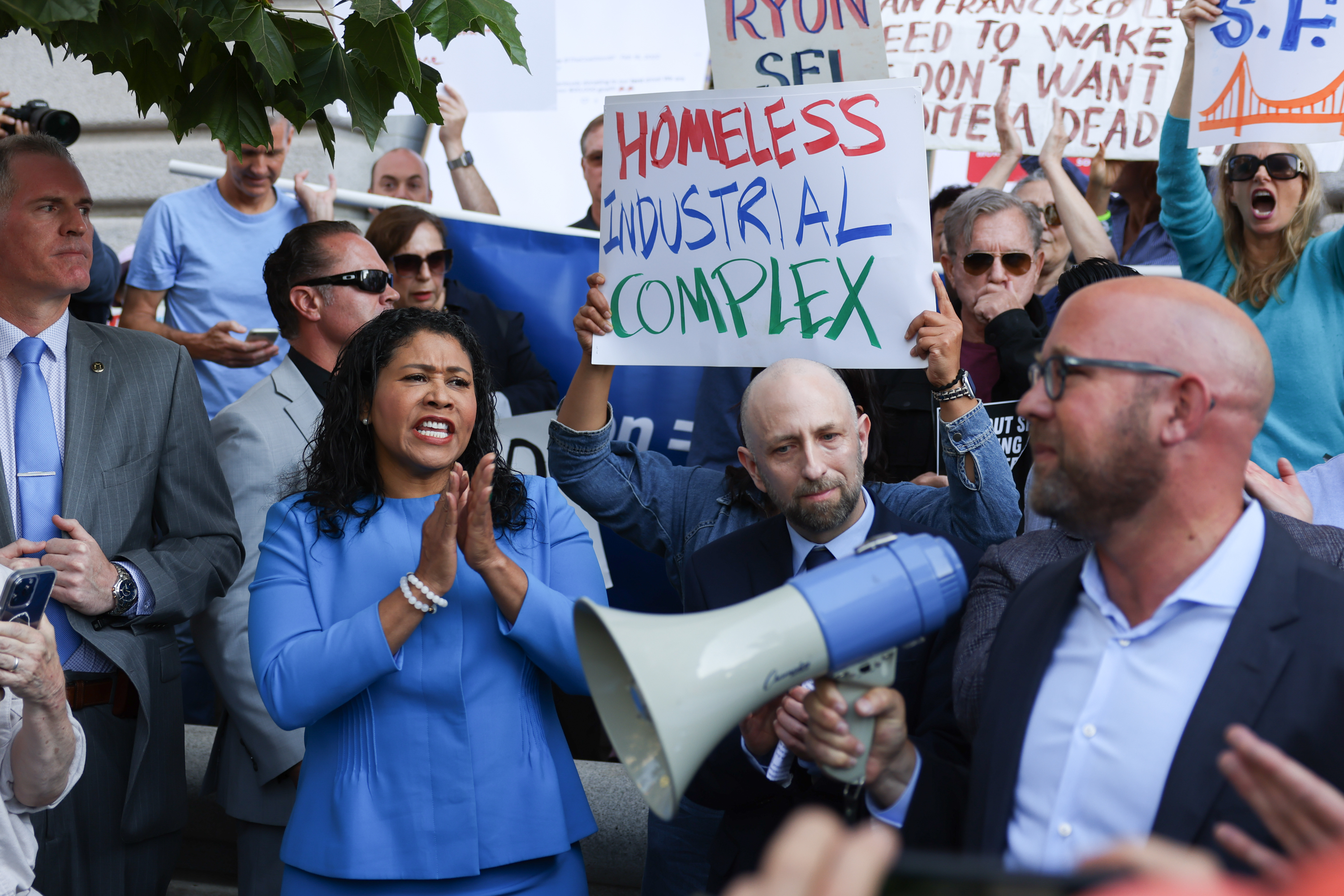At the Ninth Circuit Court of Appeals on Wednesday, San Francisco City Attorney David Chiu and a team of attorneys tried to persuade a three-judge panel to toss out a hotly debated injunction that restricts the city from clearing homeless encampments.
Outside the courthouse, raucous crowds traded opposing chants of “clean the streets” and “stop the sweeps.” Mayor London Breed and three members of the Board of Supervisors—Supervisors Rafael Mandelman, Matt Dorsey and Joel Engardio—joined at the rally, decrying the impacts of the injunction on the city and advocating for greater investments in shelter beds.
In a statement ahead of Wednesday’s hearing, Chiu said the injunction “has put our city in a terrible position, and we are seeing the adverse impacts on our streets.”
Inside the Courtroom
Deputy City Attorney Wayne Snodgrass reiterated that view in a roughly 25-minute argument before the federal appellate court Wednesday morning, saying that the injunction was too vague around the definition of “involuntarily homeless” and whether that applies to people who refuse shelter.
The three-judge panel, composed of Judges Lucy Koh, Roopali Desai and Patrick Bumatay, probed attorneys for both the city and the Coalition on Homelessness about their views on involuntary homelessness, what constitutes an “adequate” offer of shelter and whether current precedent allows the city to enforce the laws on the books.
Under the injunction, the city is barred from enforcing six specific laws related to sitting, lying and lodging on public streets. The city maintains that it does not dismantle encampments without offering shelter; however, attorneys for the coalition have argued that those offers are made speciously and only as a pretext to enforce the laws.
But during the arguments, the coalition’s attorney, Joseph Lee, acknowledged that people who refuse “genuine” offers of shelter should not be considered involuntarily homeless. In legal filings, the city has argued that people occupying encampments often refuse shelter or are otherwise housed.
In an interview, Chiu called Lee’s statement a significant concession that the city will seek to memorialize in a subsequent legal filing.
“We heard a very different public concession today that we have not heard before, which is that if the city is making a real offer of shelter to you and you refuse it, or if you otherwise have shelter, you are not considered involuntarily homeless,” Chiu said. “So that was important for us to hear.”
Chiu said that his office may ask the district court to clarify and modify the injunction.
“If we all agree that if you are offered shelter by city workers and you refuse it or you have shelter elsewhere, that the city ought to be able to enforce our rules in that instance,” he said.
Zal Shroff, an attorney with the Lawyers Committee for Civil Rights of the San Francisco Bay Area, said that the coalition agrees that the injunction doesn’t apply to those who have access to shelter. But he called the city’s offers of shelter “illusory.”
“They are playing fast and loose with offers of shelter,” Shroff said. “We’re going to have some major fights about that.”
Attorneys for the city and the Coalition on Homelessness are also due in court Thursday regarding a request that the district court appoint a special master to ensure the city is complying with the injunction.
Jennifer Friedenbach, executive director of the Coalition on Homelessness, said that the city’s operations have continued despite the injunction and pointed to a settlement offer her organization made earlier this month.
“We would love to sit down with them, and we have all along, and we’re very reasonable people in the end,” Friedenbach said. “We want a system that works, and that’s what we’re trying for.
“I think there’s been a fair amount of political posturing by city officials in this case,” she added.
Origins of the Lawsuit
The coalition sued the city in September 2022, accusing local officials of violating federal precedent and illegally destroying unhoused people’s property. Unhoused individuals have since sued the city for thousands in damages.
Chiu’s office has argued that the injunction conflicts with an earlier legal settlement that ordered the city to clear encampments in the Tenderloin and that it puts city workers in an untenable position.
The injunction also inflamed frustrations among residents who say they have no recourse in addressing encampments that grow troublesome or dangerous, even those that are linked with fires, drugs and other criminal activity.
“We shouldn’t let people camp in public, especially when those camps are correlated with drug use and disrupt business,” Mandelman said.
The coalition has argued the city doesn’t have sufficient shelter capacity, pointing to a shelter waitlist of around 400 people. At an Aug. 10 press conference, the coalition’s attorneys proposed a settlement framework with specific provisions, such as requiring the city to immediately fill supportive housing slots, excluding police from the enforcement of sit/lie laws and improving its process for filling shelter beds.
Chiu’s office balked at that proposal, calling it a “political stunt” and saying it undermined good-faith settlement negotiations.
The Ninth Circuit could take anywhere from a few weeks to several months to issue a decision on whether to invalidate all or parts of the injunction.
Breed said at a San Francisco Chamber of Commerce meeting Tuesday that the city is prepared to take its case to the Supreme Court if necessary.
The city has to be “able to clear the streets,” Breed said.
